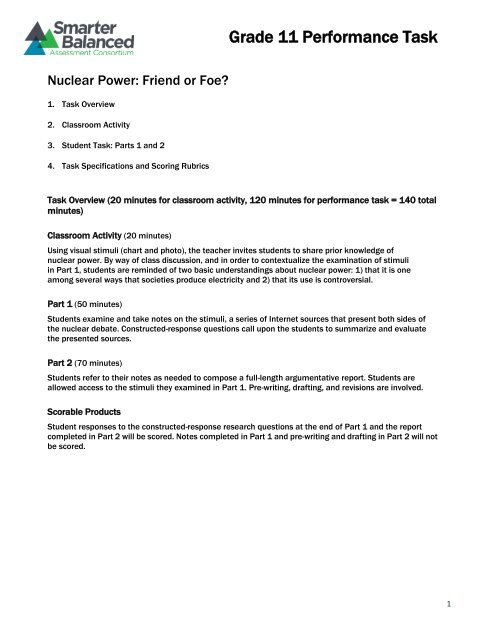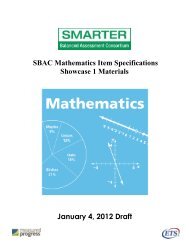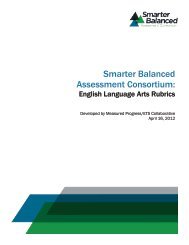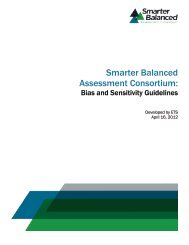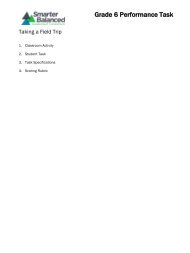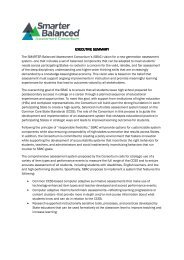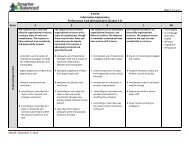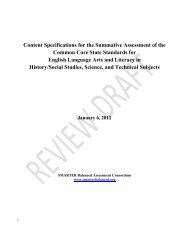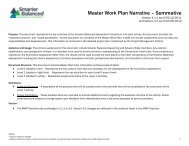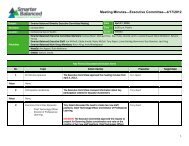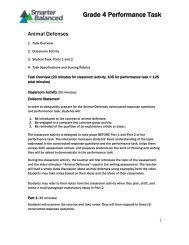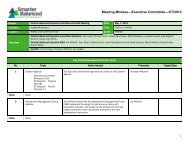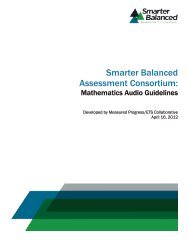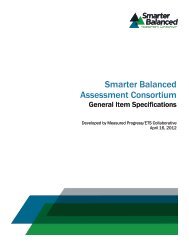Grade 11 Performance Task - Smarter Balanced Assessment ...
Grade 11 Performance Task - Smarter Balanced Assessment ...
Grade 11 Performance Task - Smarter Balanced Assessment ...
You also want an ePaper? Increase the reach of your titles
YUMPU automatically turns print PDFs into web optimized ePapers that Google loves.
<strong>Grade</strong> <strong>11</strong> <strong>Performance</strong> <strong>Task</strong><br />
Nuclear Power: Friend or Foe?<br />
1. <strong>Task</strong> Overview<br />
2. Classroom Activity<br />
3. Student <strong>Task</strong>: Parts 1 and 2<br />
4. <strong>Task</strong> Specifications and Scoring Rubrics<br />
<strong>Task</strong> Overview (20 minutes for classroom activity, 120 minutes for performance task = 140 total<br />
minutes)<br />
Classroom Activity (20 minutes)<br />
Using visual stimuli (chart and photo), the teacher invites students to share prior knowledge of<br />
nuclear power. By way of class discussion, and in order to contextualize the examination of stimuli<br />
in Part 1, students are reminded of two basic understandings about nuclear power: 1) that it is one<br />
among several ways that societies produce electricity and 2) that its use is controversial.<br />
Part 1 (50 minutes)<br />
Students examine and take notes on the stimuli, a series of Internet sources that present both sides of<br />
the nuclear debate. Constructed-response questions call upon the students to summarize and evaluate<br />
the presented sources.<br />
Part 2 (70 minutes)<br />
Students refer to their notes as needed to compose a full-length argumentative report. Students are<br />
allowed access to the stimuli they examined in Part 1. Pre-writing, drafting, and revisions are involved.<br />
Scorable Products<br />
Student responses to the constructed-response research questions at the end of Part 1 and the report<br />
completed in Part 2 will be scored. Notes completed in Part 1 and pre-writing and drafting in Part 2 will not<br />
be scored.<br />
1
<strong>Grade</strong> <strong>11</strong> <strong>Performance</strong> <strong>Task</strong><br />
Teacher Preparation / Resource Requirements<br />
This is a computer-based test that requires an interface for each test-taker. The testing software will<br />
include access to spell check, but not to grammar check. The teacher should ensure that sufficient blank<br />
paper and writing tools are available for student note-taking. Ideally, the teacher has access to a projector<br />
and PowerPoint-like software for presenting images in the introductory Classroom Activity, but these<br />
images can also be distributed as handouts.<br />
Teacher Directions for the Classroom Activity<br />
Introductory Classroom Activity (20 minutes)<br />
Present on a projector (or distribute a handout of) the pie chart on the production of electricity in<br />
the U.S. (see attached).<br />
After giving students a moment to look at the chart, ask, “What do you think this chart is telling<br />
us? What would you guess that its title or caption is?”<br />
After taking a few responses, affirm or state that the chart provides data on where electricity<br />
comes from in the United States.<br />
Invite students to briefly define the various kinds of energy sources that appear on the chart:<br />
hydroelectric, renewables, nuclear, etc.<br />
Ask, “Which of the sources accounts for just over 19% of America’s electricity?”<br />
After a student has identified nuclear power, ask, “What do you know about nuclear power? How<br />
does it produce electricity?”<br />
While students share what they know about the technology of nuclear power, show them the<br />
photograph of the functioning nuclear power plant, the Susquehanna Steam Electric Station in<br />
Pennsylvania (see attached). (Explain that the white emissions are steam.)<br />
If students do not know anything about nuclear power technology, tell them that it comes from a<br />
device (a nuclear reactor) that creates a chain reaction that breaks up the nucleus of an atom so<br />
that it produces energy. Usually heat from this process is used to generate electricity.<br />
Say to the students, “In the performance task that you are going to participate in today, you will learn<br />
more about nuclear power and the debate over its pros and cons. Eventually, you will need to take a<br />
position on whether we should encourage or discourage the use of nuclear power, and you will defend<br />
your point of view in an argumentative report. It is important to know that, as the pie chart indicates,<br />
nuclear power is one way that our country currently gets its electricity. Some people support it and think it<br />
might even be a bigger piece of the pie. Others oppose it and would like to see it disappear from the pie<br />
chart altogether.”<br />
2
<strong>Grade</strong> <strong>11</strong> <strong>Performance</strong> <strong>Task</strong><br />
Teacher Directions for Parts 1 and 2<br />
Part 1 (50 minutes)<br />
Students should receive the sources, directions, questions, report assignment, and any other material<br />
related to the task. They should receive the constructed-response questions in Part 1 and the report<br />
assignment in Part 2.<br />
1. Initiate the online testing session.<br />
2. Pass out the note-taking guide, reminding the students that its use is optional and unscored.<br />
3. Alert the students when there are 25 minutes remaining in Part 1.<br />
4. Alert the students when there are 5 minutes remaining in Part 1.<br />
5. Have students write their names on any notes. Collect all student notes.<br />
6. Close the testing session.<br />
Stretch Break<br />
Part 2 (70 minutes)<br />
1. Initiate the testing Part 2.<br />
2. Allow students to access the sources, their notes, and their answers to the constructed-response<br />
questions presented in Part 1. They will not be allowed to change their answers.<br />
3. Once 15 minutes have elapsed, suggest students begin writing the report.<br />
4. Alert the students when 30 minutes remain.<br />
5. Alert students when 15 minutes remain and suggest they begin revising their reports.<br />
6. Close the testing session.<br />
Student Directions for Parts 1 and 2<br />
Part 1 (50 minutes)<br />
Your task<br />
You will conduct some research on the pros and cons of nuclear power and then write a report arguing<br />
your opinion on the use of nuclear power for generating electricity.<br />
Steps to follow<br />
In order to plan and compose your report, you will do all of the following:<br />
1. Review and evaluate the results of an Internet search on the pros and cons of your topic.<br />
2. Make notes about the information from the sources.<br />
3
<strong>Grade</strong> <strong>11</strong> <strong>Performance</strong> <strong>Task</strong><br />
3. Answer two questions about the sources.<br />
Directions for beginning<br />
You are chief-of-staff for your local congresswoman in the U.S. House of Representatives. She has<br />
called you into her office to outline an urgent project.<br />
“I have received advance notice,” she says as you sit down, “that a power company is proposing to build a<br />
nuclear plant in the southeastern corner of our state. The plan will be announced to the public tomorrow<br />
morning, and citizens and journalists will want to know what my position is on this controversial issue. To<br />
be honest, I am not sure how I feel about it. We currently don’t have any nuclear power plants in this state,<br />
so I haven’t taken time to consider the issue deeply.”<br />
“I need you,” she continues, “to conduct a brief survey of the pros and cons of nuclear power. Summarize<br />
what you have learned and report back to me this afternoon.”<br />
Back in your office, you enter “nuclear power pros and cons” into a Google search engine, and it returns<br />
what looks like a promising mix of articles, videos, and data charts. You must review and evaluate these<br />
sources and summarize their arguments—both pro and con—before reporting back to the congresswoman.<br />
You have been provided with and are encouraged to use a note-taking guide that will help you gather and<br />
process your findings.<br />
Research Questions<br />
After you have reviewed the research sources, answer the questions below. Your answers to these<br />
questions will be scored. Also, they will help you think about the sources you have read and viewed, which<br />
should help you write your report. Answer the questions in the spaces provided below each question.<br />
1. From the sources you have reviewed, summarize 3 major arguments that support, and 3 major<br />
arguments that oppose, the use of nuclear power for generating electricity. For each of the arguments,<br />
cite at least one source that supports this fact or point of view.<br />
Argument / Fact in Favor of Nuclear Power<br />
1.<br />
2.<br />
3.<br />
Argument / Fact in Opposition to Nuclear Power<br />
1.<br />
2.<br />
3.<br />
Source Supporting This Argument<br />
Source Supporting This Argument<br />
2. Evaluate the credibility of the arguments and evidence presented by these sources. Which of the<br />
sources are more trustworthy and why? Which of the sources warrant some skepticism because of bias<br />
4
<strong>Grade</strong> <strong>11</strong> <strong>Performance</strong> <strong>Task</strong><br />
or insufficient evidence?<br />
Part 2 (70 minutes)<br />
You will now have 70 minutes to review your notes and sources, plan, draft, and revise your report. You<br />
may use your notes and refer to the sources. You may also refer to the answers you wrote to the questions<br />
in Part 1, but you cannot change those answers. Now read your assignment and the information about<br />
how your report will be scored; then begin your work.<br />
Your Assignment<br />
Back in the congresswoman’s office, you start to hand her your notes on the pros and cons of nuclear<br />
energy, but she waves away your papers.<br />
“Some emergency meetings have come up and I don’t have time to review your research notes,” she<br />
says. “Instead, go ahead and make a recommendation for our position on this nuclear power plant.<br />
Should we support the building of this nuclear plant in our state, or should we oppose the power<br />
company’s plan? Be sure that your recommendation acknowledges both sides of the issue so that<br />
people know that we have considered the issue carefully. I’ll review your report tonight and use it for the<br />
press conference tomorrow morning.”<br />
Write an argumentative report that recommends the position that your congresswoman should take on<br />
the plan to build a nuclear power plant in your state. Support your claim with evidence from the Internet<br />
sources you have read and viewed. You do not need to use all the sources, only the ones that most<br />
effectively and credibly support your position and your consideration of the opposing point of view.<br />
Report Scoring<br />
Your report will be scored on the following criteria:<br />
1. Statement of purpose / focus and organization: How well did you clearly state your claim on the<br />
topic, maintain your focus, and address the alternate and opposing claims? How well did your<br />
ideas logically flow from the introduction to conclusion using effective transitions? How well did<br />
you stay on topic throughout the report?<br />
2. Elaboration of evidence: How well did you elaborate your arguments and discussion of<br />
counterarguments, citing evidence from your sources? How well did you effectively express ideas<br />
using precise language and vocabulary that were appropriate for the audience and purpose of your<br />
report?<br />
3. Conventions: How well did you follow the rules of usage, punctuation, capitalization, and spelling?<br />
Now begin work on your report. Manage your time carefully so that you can:<br />
• plan your report<br />
• write your report<br />
• revise and edit for a final draft<br />
5
<strong>Grade</strong> <strong>11</strong> <strong>Performance</strong> <strong>Task</strong><br />
Word-processing tools and spell check are available to you.<br />
Type your response in the space provided. Write as much as you need to fulfill the requirements of the<br />
task; you are not limited by the size of the response area on the screen.<br />
6
<strong>Grade</strong> <strong>11</strong> <strong>Performance</strong> <strong>Task</strong><br />
Note-Taking Guide<br />
Research<br />
Source<br />
Published by . . .<br />
Arguments for<br />
Nuclear Power<br />
Arguments<br />
against Nuclear<br />
Power<br />
How reliable is<br />
the evidence<br />
from this<br />
source?<br />
7
<strong>Grade</strong> <strong>11</strong> <strong>Performance</strong> <strong>Task</strong><br />
Source information:<br />
Nuclear power - Wikipedia, the free encyclopedia<br />
en.wikipedia.org/wiki/Nuclear_power<br />
Nuclear power is the use of sustained nuclear fission to generate heat and electricity.<br />
Nuclear power plants provide about 6% of the world's energy and 13– 14% …<br />
James Hansen on Nuclear Energy - YouTube<br />
www.youtube.com/watch?v=alrxqx_B34s<br />
Nov 16, 2010 - 1 min - Uploaded by Newsweek Magazine<br />
“NASA’s premier climate change expert believes that<br />
next-generation, safe nuclear power is an option which we need to<br />
develop. And it is being …”<br />
LETTER TO THE EDITOR: Against plans for nuclear power plant<br />
ottumwacourier.com/letters/.../Against-plans-for-nuclear-power-plant<br />
Mar 17, 2012 – I would like to comment on Mid-American Energy's intent to build a<br />
nuclear power plant in Iowa. We already have one nuclear plant in Palo, …<br />
Look inside Fukushima's meltdown zone a year later - YouTube<br />
www.youtube.com/watch?v=-6oQAyunXqk<br />
Feb 28, 2012 - 3 min - Uploaded by CNN<br />
CNN's Kyung Lah reports from the meltdown zone. ... Look inside<br />
Fukushima's meltdown …<br />
The Truth About Nuclear Power - Reason.com<br />
reason.com/archives/20<strong>11</strong>/03/25/the-truth-about-nuclear-power<br />
The chart here uses data compiled from various sources to compare<br />
the deaths per unit of energy produced. Deaths resulting from the<br />
production of nuclear power are over 4000 times less than the rate<br />
of death resulting from the production of energy from coal.…<br />
LETTER TO THE EDITOR: Nuclear a cost-effective energy source ...<br />
www.washingtontimes.com/.../nuclear-a-cost-effective-energy-source…<br />
Jan 3, 2012 – The truly rational view of Mario Salazar on nuclear power should be a<br />
lesson on dispassionately ... The Washington Times ... LETTER TO THE EDITOR: Nuclear a<br />
cost-effective energy source ... to the real alternatives of burning gas, oil and coal, and<br />
much more reliably than alternatives like wind and solar.<br />
8
<strong>Grade</strong> <strong>11</strong> <strong>Performance</strong> <strong>Task</strong><br />
Source: U.S. EPA, eGRID, year 2005 data.<br />
9
<strong>Grade</strong> <strong>11</strong> <strong>Performance</strong> <strong>Task</strong><br />
<strong>Task</strong> Specifications:<br />
Title: Nuclear Power: Friend or Foe?<br />
<strong>Grade</strong>: 10/<strong>11</strong><br />
Claim(s): 2: Students can produce effective and well-grounded writing for a<br />
range of purposes and audiences. 4: Students can engage in<br />
research/inquiry to investigate topics and to analyze, integrate,<br />
and present information.<br />
Primary Target(s): These claims and targets will be measured by scorable evidence<br />
collected. Claim 2 7: COMPOSE FULL TEXTS: Write full persuasive<br />
pieces/arguments about topics or texts, attending to purpose and<br />
audience: establishing and supporting a claim, organizing and<br />
citing supporting evidence (from texts when appropriate) from<br />
credible sources, and providing a conclusion appropriate to<br />
purpose and audience. 8: LANGUAGE & VOCABULARY USE:<br />
Strategically use precise language and vocabulary (including<br />
academic and domain-specific vocabulary and figurative<br />
language) and style appropriate to the purpose and audience<br />
when revising or composing texts. 9: EDIT/CLARIFY: Apply or<br />
edit grade-appropriate grammar, usage, and mechanics to clarify<br />
a message and edit narrative, informational, and<br />
persuasive/argument texts. Claim 4 2: ANALYZE/INTEGRATE<br />
INFORMATION: Gather, analyze, and integrate multiple sources<br />
of information/evidence to support a presentation on a topic. 3:<br />
EVALUATE INFORMATION/SOURCES: Evaluate relevancy,<br />
accuracy, and completeness of information from multiple<br />
sources. 4: USE EVIDENCE: Cite evidence to support arguments<br />
or conjectures.<br />
CCSS/Standard(s): W-1a–e, W-4–9, L-1–3, L-6, RI-7, RLiteracy-7, WLiteracy-8–9<br />
DOK: 4<br />
Difficulty: Medium<br />
Score Points: Up to 10<br />
<strong>Task</strong> Source: SBAC / Stanford Center for <strong>Assessment</strong>, Learning, & Equity<br />
(SCALE)<br />
Item Type: <strong>Performance</strong> <strong>Task</strong>s<br />
Target-specific attributes Students with visual impairments may need alternative formats to<br />
(e.g., accessibility access written texts, graphic stimuli, and video or audiovisual<br />
issues):<br />
material. Students with physical or other impairments may need to be<br />
provided with appropriate alternative means to entering lengthy text<br />
using a keyboard.<br />
<strong>Grade</strong> Level of Stimuli: 9–10<br />
10
<strong>Grade</strong> <strong>11</strong> <strong>Performance</strong> <strong>Task</strong><br />
How this task contributes<br />
to sufficient evidence for<br />
the claims:<br />
Stimuli: Authentic Internet sources pre-selected and presented to the students<br />
as the top hits of a simulated Google search. Should present a range<br />
of media that includes text, video, and data charts. Collectively, the<br />
sources must provide an overview of the topic and present both sides<br />
of the controversy. Sources must also vary in terms of their credibility<br />
and reliance on evidence. See attached PDF for a draft of an example.<br />
Links are functioning and open actual Internet sources that could be<br />
used for this task.<br />
In order to complete the performance task, students 1. Evaluate and<br />
select information from a series of sources 2. Write an argumentative<br />
report effectively demonstrating • a clearly-established claim about<br />
the topic • presentation of relevant supporting evidence, details, and<br />
elaboration consistent with the position, sources, purpose, and<br />
audience • effective organization of ideas • adherence to<br />
conventions and rules of grammar, usage, and mechanics • control<br />
of language for purpose and audience<br />
<strong>Task</strong> Notes: This task attempts to address the challenge of assessing real-life<br />
research skills within the constraints of a standardized, on-demand<br />
test. The use of a simulated Internet search result pointing to<br />
authentic Internet sources allows the task designer to recreate the<br />
challenges posed by research in the real world: namely, most of it is<br />
now done on the Internet, which requires vigilance and skill in<br />
evaluating the reliability of what you find there. In this way, students<br />
are asked not simply to synthesize the stimuli, but to evaluate the<br />
credibility and reliability of the stimuli before synthesizing a subset of<br />
the presented sources.<br />
<strong>11</strong>
<strong>Grade</strong> <strong>11</strong> <strong>Performance</strong> <strong>Task</strong><br />
Scoring information for questions:<br />
1. Claim 4, Target 4<br />
2-point Research (<strong>Grade</strong>s 6–<strong>11</strong>)<br />
Use Evidence Rubric (Claim 4, Target 4)<br />
2<br />
The response gives sufficient evidence of the ability to cite evidence to support arguments<br />
and/or ideas.<br />
1<br />
The response gives limited evidence of the ability to cite evidence to support arguments and/or<br />
ideas.<br />
0<br />
A response gets no credit if it provides no evidence of the ability to cite evidence to support<br />
arguments and/or ideas.<br />
2. Claim 4, Target 3<br />
2-point Research (<strong>Grade</strong>s 6–<strong>11</strong>)<br />
Evaluate Information/Sources Rubric (Claim 4, Target 3)<br />
2<br />
The response gives sufficient evidence of the ability to evaluate the credibility, completeness,<br />
relevancy, and/or accuracy of the information and sources.<br />
1<br />
The response gives limited evidence of the ability to evaluate the credibility, completeness,<br />
relevancy, and/or accuracy of the information and sources.<br />
0<br />
A response gets no credit if it provides no evidence of the ability to evaluate the credibility,<br />
completeness, relevancy, and/or accuracy of the information and sources.<br />
12
Statement of Purpose/Focus and Organization<br />
<strong>Grade</strong> <strong>11</strong> <strong>Performance</strong> <strong>Task</strong><br />
Rubric and scoring information for full-write:<br />
4-Point<br />
Argumentative<br />
<strong>Performance</strong> <strong>Task</strong> Writing Rubric (<strong>Grade</strong>s 6–<strong>11</strong>)<br />
Score 4 3 2 1 NS<br />
The response is fully<br />
sustained and<br />
consistently and<br />
purposefully focused:<br />
claim is clearly<br />
stated, focused,<br />
and strongly<br />
maintained<br />
alternate or<br />
opposing claims<br />
are clearly<br />
addressed<br />
claim is introduced<br />
and communicated<br />
clearly within the<br />
purpose, audience,<br />
and task<br />
The response has a<br />
clear and effective<br />
organizational structure<br />
creating a sense of<br />
unity and<br />
completeness:<br />
consistent use of a<br />
variety of<br />
transitional<br />
strategies to clarify<br />
the relationships<br />
between and<br />
among ideas<br />
logical progression<br />
of ideas from<br />
beginning to end<br />
effective<br />
introduction and<br />
conclusion for<br />
audience and<br />
purpose<br />
strong connections<br />
among ideas, with<br />
some syntactic<br />
variety<br />
The response is<br />
adequately sustained<br />
and generally focused:<br />
claim is clear and<br />
mostly maintained,<br />
though some<br />
loosely related<br />
material may be<br />
present<br />
context provided<br />
for the claim is<br />
adequate within<br />
the purpose,<br />
audience, and task<br />
The response has an<br />
evident organizational<br />
structure and a sense<br />
of completeness,<br />
though there may be<br />
minor flaws and some<br />
ideas may be loosely<br />
connected:<br />
<br />
<br />
<br />
<br />
adequate use of<br />
transitional<br />
strategies with<br />
some variety to<br />
clarify the<br />
relationships<br />
between and<br />
among ideas<br />
adequate<br />
progression of<br />
ideas from<br />
beginning to end<br />
adequate<br />
introduction and<br />
conclusion<br />
adequate, if slightly<br />
inconsistent,<br />
connection among<br />
ideas<br />
The response is<br />
somewhat sustained<br />
and may have a<br />
minor drift in focus:<br />
may be clearly<br />
focused on the<br />
claim but is<br />
insufficiently<br />
sustained, or<br />
claim on the<br />
issue may be<br />
somewhat<br />
unclear and/or<br />
unfocused<br />
The response has an<br />
inconsistent<br />
organizational<br />
structure, and flaws<br />
are evident:<br />
inconsistent use<br />
of transitional<br />
strategies and/or<br />
little variety<br />
uneven<br />
progression of<br />
ideas from<br />
beginning to end<br />
conclusion and<br />
introduction, if<br />
present, are<br />
weak<br />
weak connection<br />
among ideas<br />
The response may<br />
be related to the<br />
purpose but may<br />
provide little or no<br />
focus:<br />
may be very<br />
brief<br />
may have a<br />
major drift<br />
claim may be<br />
confusing or<br />
ambiguous<br />
The response has<br />
little or no<br />
discernible<br />
organizational<br />
structure:<br />
<br />
<br />
few or no<br />
transitional<br />
strategies are<br />
evident<br />
frequent<br />
extraneous<br />
ideas may<br />
intrude<br />
Insufficient,<br />
illegible, in<br />
a language<br />
other than<br />
English,<br />
incoherent,<br />
off-topic, or<br />
off-purpose<br />
writing<br />
13
Evidence/Elaboration<br />
<strong>Grade</strong> <strong>11</strong> <strong>Performance</strong> <strong>Task</strong><br />
4-Point<br />
Argumentative<br />
<strong>Performance</strong> <strong>Task</strong> Writing Rubric (<strong>Grade</strong>s 6–<strong>11</strong>)<br />
Score 4 3 2 1 NS<br />
The response provides<br />
thorough and<br />
convincing<br />
support/evidence for<br />
the writer’s claim that<br />
includes the effective<br />
use of sources, facts,<br />
and details. The<br />
response achieves<br />
substantial depth that<br />
is specific and relevant:<br />
use of evidence<br />
from sources is<br />
integrated,<br />
comprehensive,<br />
relevant, and<br />
concrete<br />
effective use of a<br />
variety of<br />
elaborative<br />
techniques<br />
The response clearly<br />
and effectively<br />
expresses ideas, using<br />
precise language:<br />
use of academic<br />
and<br />
domain-specific<br />
vocabulary is<br />
clearly appropriate<br />
for the audience<br />
and purpose<br />
The response provides<br />
adequate<br />
support/evidence for<br />
the writer’s claim that<br />
includes the use of<br />
sources, facts, and<br />
details. The response<br />
achieves some depth<br />
and specificity but is<br />
predominantly general:<br />
some evidence<br />
from sources is<br />
included, though<br />
citations may be<br />
general or<br />
imprecise<br />
adequate use of<br />
some elaborative<br />
techniques<br />
The response<br />
adequately expresses<br />
ideas, employing a mix<br />
of precise with more<br />
general language:<br />
use of<br />
domain-specific<br />
vocabulary is<br />
generally<br />
appropriate for the<br />
audience and<br />
purpose<br />
The response<br />
provides uneven,<br />
cursory<br />
support/evidence for<br />
the writer’s claim<br />
that includes partial<br />
or uneven use of<br />
sources, facts, and<br />
details. The response<br />
achieves little depth:<br />
evidence from<br />
sources is weakly<br />
integrated, and<br />
citations, if<br />
present, are<br />
uneven<br />
weak or uneven<br />
use of<br />
elaborative<br />
techniques<br />
The response<br />
expresses ideas<br />
unevenly, using<br />
simplistic language:<br />
use of<br />
domain-specific<br />
vocabulary may<br />
at times be<br />
inappropriate for<br />
the audience<br />
and purpose<br />
The response<br />
provides minimal<br />
support/evidence<br />
for the writer’s claim<br />
that includes little or<br />
no use of sources,<br />
facts, and details:<br />
Use of evidence<br />
from sources is<br />
minimal,<br />
absent,<br />
incorrect, or<br />
irrelevant<br />
The response’s<br />
expression of ideas<br />
is vague, lacks<br />
clarity, or is<br />
confusing:<br />
uses limited<br />
language or<br />
domain-specific<br />
<br />
vocabulary<br />
may have little<br />
sense of<br />
audience and<br />
purpose<br />
Insufficient,<br />
illegible, in<br />
a language<br />
other than<br />
English,<br />
incoherent,<br />
off-topic, or<br />
off-purpose<br />
writing<br />
14
Conventions<br />
<strong>Grade</strong> <strong>11</strong> <strong>Performance</strong> <strong>Task</strong><br />
2-Point<br />
Argumentative<br />
<strong>Performance</strong> <strong>Task</strong> Writing Rubric (<strong>Grade</strong>s 6-<strong>11</strong>)<br />
Score 2 1 NS<br />
The response demonstrates an<br />
adequate command of<br />
conventions:<br />
<br />
errors in usage and sentence<br />
formation may be present,<br />
but no systematic pattern of<br />
errors is displayed and<br />
meaning is not obscured<br />
The response demonstrates a<br />
partial command of conventions:<br />
<br />
<br />
errors in usage may obscure<br />
meaning<br />
inconsistent use of<br />
punctuation, capitalization,<br />
and spelling<br />
Insufficient, illegible, in a<br />
language other than English,<br />
incoherent, off-topic, or<br />
off-purpose writing<br />
<br />
adequate use of punctuation,<br />
capitalization, and spelling<br />
15


